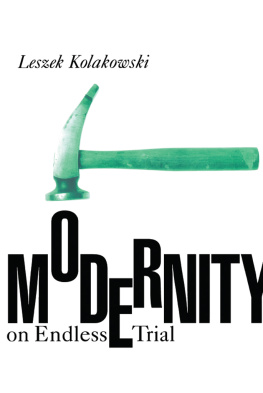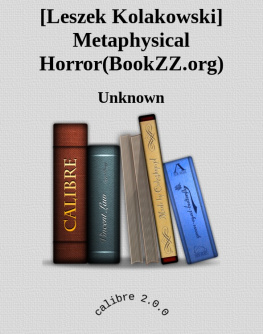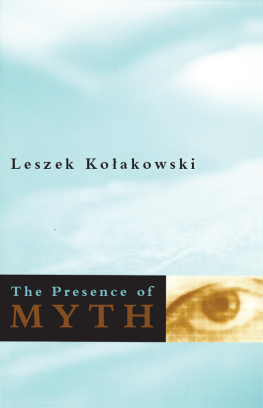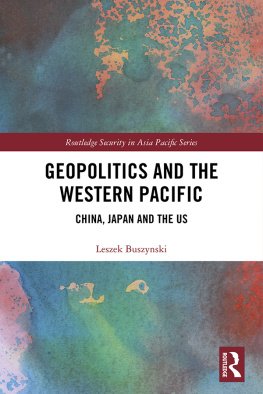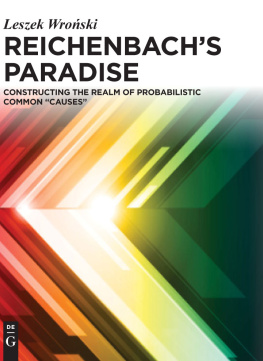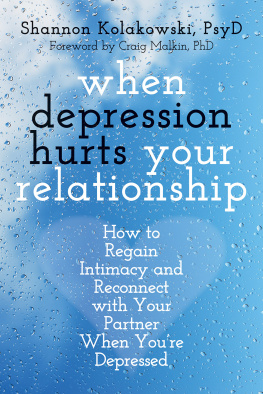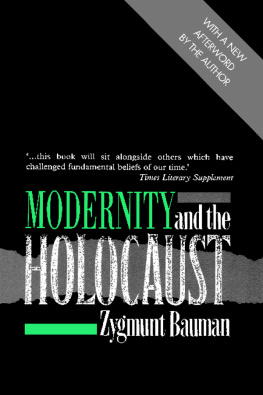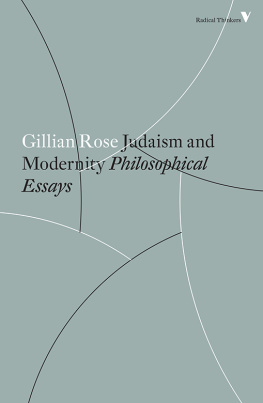Leszek Kolakowski - Modernity on Endless Trial
Here you can read online Leszek Kolakowski - Modernity on Endless Trial full text of the book (entire story) in english for free. Download pdf and epub, get meaning, cover and reviews about this ebook. year: 1990, publisher: University of Chicago Press, genre: Religion. Description of the work, (preface) as well as reviews are available. Best literature library LitArk.com created for fans of good reading and offers a wide selection of genres:
Romance novel
Science fiction
Adventure
Detective
Science
History
Home and family
Prose
Art
Politics
Computer
Non-fiction
Religion
Business
Children
Humor
Choose a favorite category and find really read worthwhile books. Enjoy immersion in the world of imagination, feel the emotions of the characters or learn something new for yourself, make an fascinating discovery.
- Book:Modernity on Endless Trial
- Author:
- Publisher:University of Chicago Press
- Genre:
- Year:1990
- Rating:4 / 5
- Favourites:Add to favourites
- Your mark:
- 80
- 1
- 2
- 3
- 4
- 5
Modernity on Endless Trial: summary, description and annotation
We offer to read an annotation, description, summary or preface (depends on what the author of the book "Modernity on Endless Trial" wrote himself). If you haven't found the necessary information about the book — write in the comments, we will try to find it.
Modernity on Endless Trial — read online for free the complete book (whole text) full work
Below is the text of the book, divided by pages. System saving the place of the last page read, allows you to conveniently read the book "Modernity on Endless Trial" online for free, without having to search again every time where you left off. Put a bookmark, and you can go to the page where you finished reading at any time.
Font size:
Interval:
Bookmark:
Modernity on Endless Trial
Leszek Kolakowski
The University of Chicago Press
Chicago and London
The University of Chicago Press, Chicago 60637
The University of Chicago Press, Ltd., London
1990 by The University of Chicago
All rights reserved. Published 1990
Paperback edition 1997
Printed in the United States of America
01 00 99 98 97 5 4 3 2
ISBN 978-0-226-21740-6 (ebook)
Library of Congress Cataloging-in-Publication Data
Koekowski, Leszek.
Modernity on endless trial / Leszek Kolakowski.
p. cm.
ISBN 0-226-45045-7 (cloth)
ISBN 0-226-45046-5 (paperback)
1. Civilization, Modern20th century. 2. Philosophy, Modern20th century. 3. CivilizationPhilosophy. I. Title.
CB430.K64 1990
909.82dc20
9035966
CIP
This book is printed on acid-free paper.
Foreword
The essays selected for this book were written on various occasions and in various languages between 1973 and 1986. They do not purport to offer any philosophy. They are, rather, semiphilosophical sermons in which I was trying to point out a number of unpleasant and insoluble dilemmas that loom up every time we attempt to be perfectly consistent when we think about our culture, our politics, and our religious life. More often than not we want to have the best from incompatible worlds and, as a result, we get nothing; when we instead pawn our mental resources on one side, we cannot buy them out again and we are trapped in a kind of dogmatic immobility. We might imagine ourselves to be treasure hunters in a forest, but we spend our effort on evading ambushes, and if we succeed, our success is precisely that: evading ambushes. This is a net gain, of course, but not the one we were after.
Therefore these essays are not edifying. They are rather appeals for moderation in consistencya topic which I have been trying to look at from various angles for many years.
Since these texts were written separately and without any idea of them appearing together in one volume, some remarks might be repeated here and there. This does not worry me much, for whoapart from myself, under duresswould be persistent enough to wade through the whole thing, anyway?
Leszek Kolakowski
3 March 1990
PART ONE
On Modernity, Barbarity, and Intellectuals
Chapter One
Modernity on Endless Trial
If we are to believe Hegelor Collingwoodno age, no civilization, is capable of conceptually identifying itself. This can only be done after its demise, and even then, as we know too well, such an identification is never certain or universally accepted. Both the general morphology of civilizations and the descriptions of their constitutive characteristics are notoriously controversial and heavily loaded with ideological biases, whether they express a need for self-assertion by comparison with the past or a malaise in ones own cultural environment and the resulting nostalgia for the good times of old. Collingwood suggests that each historical period has a number of basic (absolute) presuppositions which it is unable clearly to articulate and which provide a latent inspiration for its explicit values and beliefs, its typical reactions and aspirations. If so, we might try to uncover those presuppositions in the lives of our ancient or medieval ancestors and perhaps build on this basis a history of mentalities (as opposed to the history of ideas); but we are in principle prevented from revealing them in our own age, unless, of course, the owl of Minerva has already flown out, and we are living in the twilight, at the very end of an epoch.
And so, let us accept our incurable ignorance of our own spiritual foundation and be satisfied with the survey of the surface of our modernity, whatever the word might mean. Whatever it means, it is certain that modernity is as little modern as are the attacks on modernity. The melancholic Ah, nowadays... , there is no longer... , in olden days... , and similar expressions contrasting the corrupted present with the splendor of the past are probably as old as the human race; we find them in the Bible and in the Odyssey. I can well imagine paleolithic nomads angrily resisting the foolish idea that it would be better for people to have permanent dwellings or predicting the imminent degeneration of mankind as a result of the nefarious invention of the wheel. Mankinds history conceived as a degradation belongs, as we know, to the most persistent mythological topics in various parts of the world, including both the symbol of the exile and Hesiods description of the five ages. The frequency of such myths suggests that, apart from other possible social and cognitive functions, they voice a universally human, conservative mistrust of changes, a suspicion that progress, on second thought, is no progress at all, a reluctance to assimilate transformations, however beneficial in appearance, of the established order of things.
The changes go on, nonetheless, and they usually find a sufficient number of enthusiastic supporters. The clash between the ancient and the modern is probably everlasting and we will never get rid of it, as it expresses the natural tension between structure and evolution, and this tension seems to be biologically rooted; it is, we may believe, an essential characteristic of life. It is obviously necessary for any society to experience the forces both of conservation and of change, and it is doubtful whether any theory will ever provide reliable tools for measuring the relative strength of those opposite energies in any given society, so that we could add and subtract them from each other like quantifiable vectors and build on this basis a general schema of development, endowed with predictive power. We can only guess what gives some societies the ability to assimilate rapid changes without falling apart, what makes others satisfied with a very slow pace of development, and under precisely what conditions development or stagnation lead to violent crises or to self-destruction.
Curiosity, that is, the separate drive to explore the world disinterestedly, without being stimulated by danger or physiological dissatisfaction, is, according to students of evolution, rooted in specific morphological characteristics of our species and thus cannot be eradicated from our minds as long as the species retains its identity. As both Pandoras most deplorable accident and the adventures of our progenitors in Paradise testify, the sin of curiosity has been the main cause of all the calamities and misfortunes that have befallen mankind, and it has unquestionably been the source of all its achievements.
The impulse to explore has never been evenly distributed among the worlds civilizations. Generations of scholars have asked why the civilization that emerged from joint Greek, Latin, Judaic, and Christian sources was so uniquely successful in promoting and spreading rapid and accelerating changes in science, technology, art, and social order, whereas many cultures survived for centuries in almost stagnant conditions, affected only by barely noticeable changes or sunk into slumber after short-lived eruptions of creativity?
There is no good answer. Each civilization is a contingent agglutination of various social, demographic, climatic, linguistic and psychological circumstances and any search for one ultimate cause of its emergence or decline seems very unpromising. When we read studies which purport to show, for example, that the Roman empire collapsed because of the widespread use of lead pots, which poisoned and damaged the brains of the upper classes, or that the Reformation can be accounted for by the spread of syphilis in Europe, we cannot keep from strongly doubting their validity. On the other hand, the temptation to look for causes is hard to resist, even if we guess that civilizations arise and crumble under the impact of uncountable factors, independent of each other, and that the same may be said about the emergence of new animal or plant species, about the historical locations of cities, the distribution of mountains on the surface of the earth, or the formation of particular ethnic tongues. By trying to identify our civilization, we try to identify ourselves, to grasp the unique, collective ego which we sense is necessary and whose nonexistence would be as inconceivable as my own nonexistence is for me. And so, even though there is no answer to the question Why is our culture what it is? it is unlikely that we can delete the question from our minds.
Next pageFont size:
Interval:
Bookmark:
Similar books «Modernity on Endless Trial»
Look at similar books to Modernity on Endless Trial. We have selected literature similar in name and meaning in the hope of providing readers with more options to find new, interesting, not yet read works.
Discussion, reviews of the book Modernity on Endless Trial and just readers' own opinions. Leave your comments, write what you think about the work, its meaning or the main characters. Specify what exactly you liked and what you didn't like, and why you think so.

